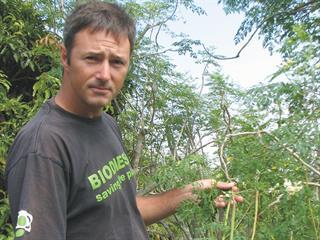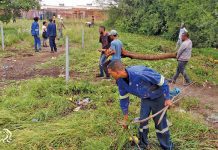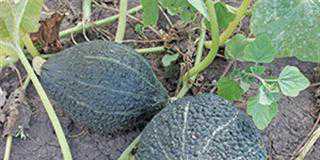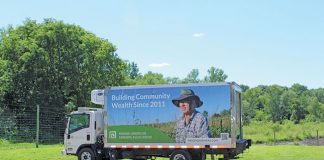
KwaZulu-Natal biofuel company Vuthwa has spent R8 million in the past five years, searching for a biodiesel crops that will give high yields on marginal soils and be easy to manage as a community project. And the crop they’ve settled on is India’s Moringa oleifera because it is ideally suited to produce biodiesel and related products, and provides valuable nutrition.
The moringa is frequently referred to as “the miracle tree” because all of its parts – from the leaves to flowers, seeds, bark and roots – have nutritional and medicinal uses. Seed pods are oil-rich, yielding 38% to 40% of buttery yellow oil. The oil is highly sought after by cosmetic and pharmaceutical companies, and can be used in cooking, for engine lubrication, and more importantly, as biodiesel.
Even when grown for biodiesel, moringa adds to food security. It’s one of the top three most nutritious vegetables in the world and was identified by the World Health Organisation as a famine-busting plant.
“The multiple uses of moringa make it ideal as a community upliftment crop,” says Vuthwa technical director Peter Camp. “A product mix is key to ensuring an income spread and to providing jobs and food security. We don’t want to lock communities into a crop that has only one application in case there is a problem with that market. Even though South Africa could never produce enough biodiesel to run all its vehicles, it’s still important to get this product mix.”
In 2008, South Africa used 10,2 million litres of diesel. “Biodiesel should be supplied by local communities and used locally. Apart from the money we could be ploughing back into communities, it would help reduce South Africa’s carbon footprint,” he says.
Moringa is not listed as an invasive species and Vuthwa says it poses an extremely low risk of spreading naturally. The Department of Agriculture has asked Vuthwa to prove as much, and once that is done, the company can establish huge moringa plantations in KZN.
Its pilot project is already underway in the Ilembe district near Stanger, where it aims to have 3 000ha under moringa and improve the lives of roughly 1 500 families.
“This will be South Africa’s first sustainable biodiesel project from locally grown energy crops, in line with the government’s biofuel policy,” says Peter.
Under this scheme, community members with access to small plots of land will be organised into cooperatives with five members each. They grow the crop with a guaranteed offtake agreement at a contracted price, and supply the oil-rich seed pods to a nearby centralised biodiesel plant.
Each cooperative applies for funding that will cover the cost of planting and production. Vuthwa has a five-year track record as a commercial biodiesel producer and has set up a one-stop moringa support centre, offering everything from seeds to advice on setting up plantations and off-take contracts.
“We provide everything that is required to make this succeed. The guaranteed offtake agreement will provide an income directly proportional to the work the cooperatives put in.”
Establishing a nursery to provide planting material is part of the proposed activities although the high setup costs have Vuthwa running trials with direct seeding.
Vuthwa is a major shareholder in the biodiesel production facility. When in full swing, the communities will have a minimum 26% shareholding in the facility. It’s here that the seeds are crushed to produce biodiesel, and glycerine is split off.
The profit will be split with the cooperatives in terms of their shareholding. The outgrowers will also have access to the biodiesel production byproducts at a nominal cost, which will spur on entrepreneurial activities.
“Glycerine has many commercial and industrial uses – 100t of biodiesel produces 10t of organic glycerine,” says Peter. “The cosmetic and food industries are very excited as it’s a non-petroleum-based product. Soap is one product that can be made from the glycerine-rich waste. And why not? Any way you can alleviate poverty and generate an extra income counts.”
Two years to harvest
The moringa is a robust, perennial tree. In KwaZulu-Natal it can grow 1,2m to 1,4m in six to eight months. Trees take about two years to produce a significant harvest and produce seeds for four to five months of the year.
The pod can sit on the tree for two to three months after ripening and can be stored and delivered to the production facility in a steady stream to ensure the community and production facility a year-round income.
The 600mm seed pods, which contain pea-sized seeds, can produce 1 400l to 1 600l oil/ha/annum when planted at a density of 625 trees/ha. Sales from the pods should generate R7 500/family/year, equating to R11,25 million into the community from the 1 500 families involved.
Vuthwa has looked into soya and sunflower as potential biodiesel crops for communities but has dismissed them. “From a community upliftment perspective, these are very labour-intensive crops,” says Peter.
Moringa is not a suitable investment for commercial farmers as the returns are not high enough. “It’s a creator of family wealth for communities with underutilised, marginal land,” he says.
“Biodiesel is about the environment and sustainability. We’re trying to move away from traditional, labour-intensive crops.”













